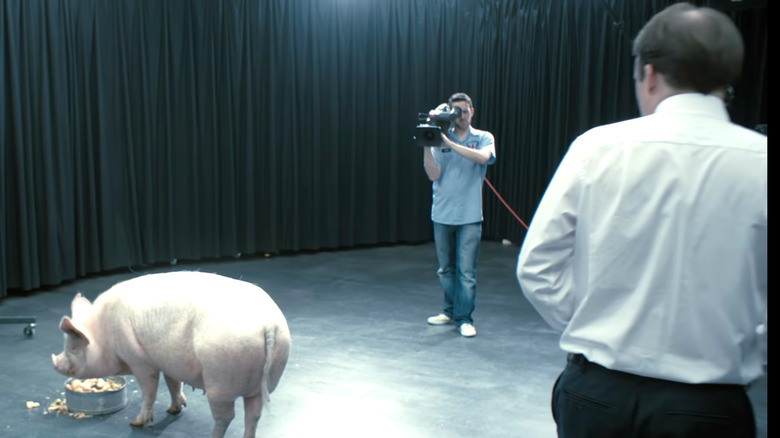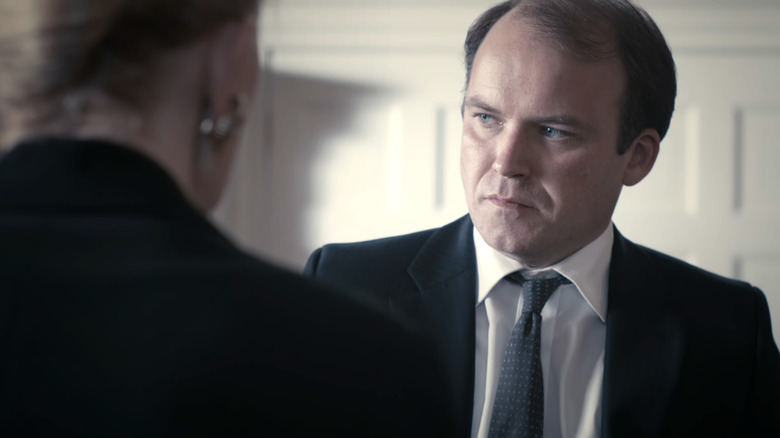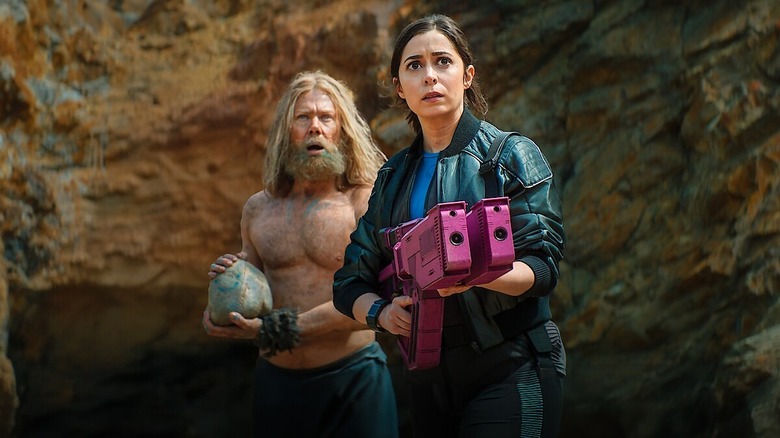Why Black Mirror Avoided Casting Comedians In The Early Seasons
The Netflix era of "Black Mirror" constantly makes headlines for its star-studded cast. The biggest celebrity cameo in an episode was probably Miley Cyrus' semi-meta role in season 5, but perhaps the most surprising celebrities to show up were the ones best known for being funny. Season 7 featured Rashida Jones of "Parks and Recreation" fame, Chris O'Dowd from "The IT Crowd," Cristin Milioti from "How I Met Your Mother," Awkwafina from "Nora From Queens," Issa Rae from "Insecure," and so on. A show that's known for being bleak and serious is now routinely being led by actors known for their sitcom shenanigans.
It's a big shift from the early Channel 4 seasons of "Black Mirror," where the lead actors were always best known for their previous dramatic roles. Some of this change is the natural result of "Black Mirror" becoming a hit show with near limitless casting options, but part of it's simply due to the show's creators loosening up.
In the behind-the-scenes book "Inside Black Mirror," published in 2018, executive producer Annabel Jones talked about the tone the show was trying to capture for the series' first episode, "The National Anthem." As she explained:
"In the casting and the production design, this had to be as real as it could be. So we were blessed to have Rory Kinnear as the Prime Minister Michael Callow. I'm very anti casting any comedy actors in Black Mirror. At the very beginning, this approach felt crucial, because we needed this to not feel like comedy. Charlie's history, and the perception of him in the UK, was as a comedy writer, so it could have tipped too far that way."
'The National Anthem' portrayed a comedic premise 100% straight
It makes sense that this was what the show was concerned about in its first season. Before "Black Mirror," showrunner Charlie Brooker was best known for writing comedy series like "Newswipe" or "Nathan Barley." When the "Black Mirror" pilot featured the Prime Minister being forced to have sex with a pig in order to save a member of the Royal Family, the first assumption most of the British audience might've had was that this was meant to be funny.
Granted, "The National Anthem" is still kind of funny (especially when you write the plot down), but for most viewers, the main feeling they get from the episode is dread and despair. Part of that's due to how dead-serious every single actor involved is playing the situation, and part of it's due to the sheer level of restraint Brooker put into his script. The long-time comedy writer had to suppress every funny instinct in his body to pull the episode off. As Brooker explained:
"There were probably more jokes in the original script. In one scene, the porn star Rod Senseless has a conversation with the Prime Minister, but its weird comedic tone felt misplaced. At that point in the story, the milk had already curdled and the tone had already gone all disturbing and heavy. And then suddenly, Rod Senseless pops up to give the Prime Minister advice on how to f**k a pig."
But despite Jones' and Brooker's apparent reluctance to hire comedic actors in those first few seasons, actors with comedy on their resumes started showing up more and more as "Black Mirror" went on. By the time Awkwafina showed up in a major role in season 7, the comedic actors' constant presence had become the new norm.
Season by season, the 'Black Mirror' writers slowly embraced their comedic roots
What changed the showrunners' minds about hiring comedic actors? It mostly seems to be the fact that, ever since the show blew up in popularity after Netflix bought the rights, Charlie Brooker no longer has a reputation as a comedy writer. Post-2016, Brooker has been primarily known as a dark and twisted sci-fi artist, to the point where a lot of new viewers are surprised to find out he used to write straightforward comedy. Nowadays, Brooker doesn't have to prove that he can do hard-hitting sci-fi drama. He can relax a little and stop resisting the urge to throw in more jokes, more lighthearted endings.
In a few interviews over the years, Brooker addressed the show's growing comedic edge by noting that it was a necessary change of pace. The "Black Mirror" team had to break from the constant cynicism of the earlier seasons, not just because they had a new international audience, but because at a certain point, fans grow tired of leaving every episode with a pit in their stomachs.
"I was aware we're going on a global platform now, so we've got to make these stories a bit more international," Brooker said at a 2020 panel (via The Independent). "And I wanted to mix it up a bit, as in not just keep doing bleak-a-thons."


